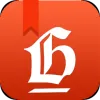Take a look inside 5 images
Gutenberg Literature
Pros: Simple interface offers extensive access to Project Gutenberg's vast resources.
Cons: Bare-bones, buggy features add little value to the texts on offer.
Bottom Line: Users get an extraordinary number of texts, but the app doesn't offer meaningful tools to engage with them.
Teachers might use Gutenberg Literature as a supplement to in-class activities and shorter homework assignments. Project Gutenberg's archives include primary source documents and literary texts spanning thousands of years, and the app can offer students surprising access to high-quality digital scans of rare books. This is a great opportunity to explore what classic literature looked like to its first readers. Unfortunately, the app lacks key ereader features like bookmarking, annotation, and highlighting, so it might be better suited to in-class discussions of shorter works rather than concentrated reading of novels and short stories.
With so little support and stability, Gutenberg Literature might be a risky choice for a teacher's classroom. Other ereaders may offer better workarounds for accessing the wealth of resources amassed by Project Gutenberg.
Project Gutenberg is an ambitious project to digitize and catalog great works of literature from around the world. Since the project's inception in the early 1970s, Project Gutenberg has created a database that includes tens of thousands of public domain texts, all available online for free download and use.
The Gutenberg Literature app has nothing to do with these people. To be fair, the app's developers are up front about this. This app is transparently a viewer that helps translate that immense library into a format that's more approachable for the iOS. With Gutenberg Literature, users can search the entire Project Gutenberg database and download texts directly to the device. Texts can be saved for offline viewing, so the user can peruse the complete works of William Shakespeare or Sir Arthur Conan Doyle at will. The books available are impressive: Readers can choose to read Plato and Tolstoy in translation or Joyce and Whitman in their original English. Users can search for texts by typing in their exact titles or by browsing extensive categories (which include everything from African American Writers to Witchcraft). Users can also bring up a "random" book from the project's more than 44,000 current entries.
The best thing about this app is that it offers a convenient, visually simple way to search the wealth of resources available through Project Gutenberg. Unfortunately, its utility seems to end there. Options to resize, move, and invert the color of the text don't toggle back and forth and instead lock immediately after being selected. You have to reload in order to reset any changes made. The app is especially buggy with the iOS's built-in accessibility tools: It's difficult to select text to use the "Speak Selection" tool, and once in use it is nearly impossible to select text to stop the speech function.
In addition, it's not clear that Gutenberg Literature is a priority for its developers. The app repeatedly prompts users to upgrade to paid version of the app. You can pay $.99, a dialog box suggests, or give the app a five-star review on the Apple app store in order to receive it for free. (This may explain the app's many five-star reviews.) The last updates to the app's FAQ page are from 2012, and the questions and answers don't stray far beyond describing how to search for texts and mark some as favorites. Also, the app's page on the App Store features a screenshot that boasts the app is "Completely Legal" and "Completely Free," and that it features "Quality Litrature" [sic]. This may not inspire confidence in teachers or students.











